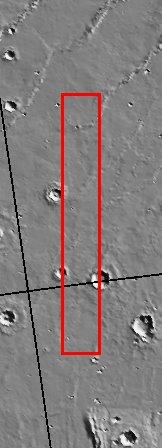
Released August 5, 2004
This image shows two representations of the same infra-red image covering a portion of the Solis Planum region, southeast of the Tharsis volcanoes. On the left is a grayscale image showing surface temperature, and on the right is a false-color composite made from 3 individual THEMIS bands. The false-color image is colorized using a technique called decorrelation stretch (DCS), which emphasizes the spectral differences between the bands to highlight compositional variations.
Multiple layers of lava flows in this region show temperature differences, as well as some potential compositional differences. The temperature variations between these flows are likely caused by differences in their surface texture. The compositional variation could be due to differences in the make-up of the lava when it erupted onto the surface or might only reflect differences in the amount of dust covering these flows.
Image information: IR instrument. Latitude -30.1, Longitude 275.9 East (84.1 West). 100 meter/pixel resolution.
Note: this THEMIS visual image has not been radiometrically nor geometrically calibrated for this preliminary release. An empirical correction has been performed to remove instrumental effects. A linear shift has been applied in the cross-track and down-track direction to approximate spacecraft and planetary motion. Fully calibrated and geometrically projected images will be released through the Planetary Data System in accordance with Project policies at a later time.
NASA's Jet Propulsion Laboratory manages the 2001 Mars Odyssey mission for NASA's Office of Space Science, Washington, D.C. The Thermal Emission Imaging System (THEMIS) was developed by Arizona State University, Tempe, in collaboration with Raytheon Santa Barbara Remote Sensing. The THEMIS investigation is led by Dr. Philip Christensen at Arizona State University. Lockheed Martin Astronautics, Denver, is the prime contractor for the Odyssey project, and developed and built the orbiter. Mission operations are conducted jointly from Lockheed Martin and from JPL, a division of the California Institute of Technology in Pasadena.

 Planetary Data System
Planetary Data System













